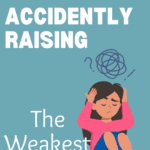Are modern parents unknowingly raising the weakest generation yet? Let’s look at how we are accidently creating broken children – and how to fix the problem before it’s out of our control.
Let’s consider some modern themes that society is telling our children every day:
- “Do whatever makes you happy!”
- “Love yourself first!”
- “You can be whatever you want to be!”
- “Everyone is a winner!”
While some of these themes sound cute and harmless – I can imagine they would make our ancestors turn over in their graves.
This upcoming generation is focused on me, me, and me. And when push comes to shove, this type of mindset it not going to stand up to even small obstacles or adversity.
And you can bet this generation won’t stick together when times are tough.
It’s time to shine a light on common parenting pitfalls and explore how we can empower the next generation to become resilient, adaptable, and confident individuals – before it becomes an emergency situation.

11 Ways Parents are Raising the Weakest Generation
In this fast-paced world, where instant gratification and constant validation are the norm, children may be missing out on important life skills.
Are we unintentionally raising a generation that lacks resilience, problem-solving abilities, and self-reliance?
Let’s look at 11 common things modern parents are doing (or failing to do) that may lead to the weakest generation yet to come.
1) Parents are Sheltering Kids from Adversity and Discomfort
While trying to give our kids the best life, we are accidently creating mini “ideal worlds” for them.
In a given day, most children don’t experience any adversity or discomfort – mentally, physically, or emotionally.
If they are bored, we hand them a tablet. When they lose, we still give them a trophy. If they are tired, they can skip their chores. When they do bad on a test, we call their teacher.
Though it may feel unnatural for us as parents, we must sometimes step aside and give our children the opportunity to fail and feel negative feelings.
If we don’t do this – when things don’t go well in the real world they will crumble. Try these 5 tips for raising resilient kids.
2) Kids are Not Learning Any Real-World Skills
My son learned everything there is to know this year about the war of 1812. He can do the Pythagorean theorem like a pro. But when I recently asked him to load the dishwasher, he looked at me like I asked him to build a pyramid.
Learning is awesome. But modern kids are seriously lacking in real life skills. Kids aren’t typically taught how to pay bills or balance their finances.
Most kids are never taught how to garden, cook, or fix things.
If we don’t pass on these important skills to our children now, then it will only take one generation for them to be eliminated.
Learn the Importance of Family Roots and Traditions here.

3) Society is Focusing Too Much on Self-Love
Our generation is making another huge parenting mistake. And, ironically, it is all while we are trying to be seen as good parents.
As parents, we are so focused on pride, self-love, and materialistic accomplishments that in our quest to raise confident, well-adjusted kids, we are actually raising overly sensitive, entitled children.
Teaching humility enables children to develop a deep understanding and appreciation for the accomplishments and talents of others. By acknowledging their own limitations and recognizing the strengths of others, they learn to celebrate diversity and foster inclusive relationships – which strengthens us all!
Read Parenting Tips on Raising Humble Kids here!
4) Parents are Causing Narcissistic Behavior
When it comes to raising the weakest generation, narcissistic behavior is a contributing factor.
Unfortunately, research shows that narcissism is on the rise, especially among the younger generation. Parents are teaching kids to be narcissists without even realizing it.
Experts were able to pinpoint exactly the two specific parenting mistakes that lead to narcissistic kids: overindulging AND underindulging.
Parents who raise narcissist kids overindulge their children when it comes to focusing on achievements, outcomes, and materialistic elements – and underindulge them when it comes to warmth, love, and empathy.
For more information on How to Avoid Raising Narcissistic Children, click here.
5) Kids are Overscheduled – and Overly Distracted
In today’s competitive world, parents often feel the pressure to enroll their children in a multitude of activities in order to give them a competitive edge. From sports to music lessons to extracurricular clubs, children’s schedules are packed with back-to-back activities.
While it’s important for children to explore their interests and develop diverse skills, over-scheduling can have negative consequences.
When children are constantly rushing from one activity to another, they may not have enough time for unstructured play, relaxation, or simply being kids- and other things that really matter.
It’s important to prioritize quality over quantity and ensure that our children have enough free time to – dare I say, learn to be bored.
6) Emphasis is on Outcomes and Exceeding at Everything
It is said that Thomas Edison failed 1000 times before successfully inventing the the light bulb. When asked how it felt to fail 1,000 times, Edison simply said, “I didn’t fail 1,000 times. The light bulb was an invention of 1,000 steps.”
I am just saying.
Grit, or strength of will, isn’t necessarily about coming in first place or earning the big bucks. It isn’t about the outcome. It’s about the process.
Children who are only rewarded for outcomes, and not efforts, develop priorities that reside in winning – or develop anxiety.
Neither is productive when they grow older.

7) Parents are too Overprotective
In our quest to protect and guide our children, it’s easy to fall into the trap of making decisions for them instead of empowering them to make their own choices.
When children are constantly told what to do and how to do it, they may struggle to develop independence, critical thinking skills, and the ability to take responsibility for their actions.
Instead of making decisions for our children, we should guide them and provide them with opportunities to practice decision-making in a safe and supportive environment. By teaching children how to weigh options, consider consequences, and make informed choices, we empower them to become independent and confident individuals.
8) Parents are Misinterpreting “Gentle Parenting”
Simply put, gentle parenting is a softer, gentler approach to parenting. Parents who practice gentle parenting use consistency, patience and boundaries to guide their children. It relies less on blame and shame.
While I love some of the aspects of gentle parenting, parents sometimes misinterpret it. It is important to remember that gentle parenting does NOT mean:
- Eliminating consequences or boundaries
- Having your children dictate what is best for themselves
- That there should be any less respect for the parent
It is important to find a balance between this parent-child collaboration while still remember that the parent is in charge.
9) Kids are Exposed to Excessive Screen Time and Social Media Prematurely
Potentially one of the biggest contributing factors to our weaking generation is overuse of screen time and children being exposed to social media at young ages.
Excessive screen time has been linked to a huge number of issues, including decreased physical activity, poor sleep, social isolation, and difficulties with attention and concentration. Cyberbullying and dopamine surges (shown to happen with scrolling) also are huge problems for our children.
As parents, it’s crucial that we set boundaries and establish screen time limits for our children.
To avoid raising little technology-zombies, we must prioritize real-world experiences, outdoor play, and face-to-face interactions.
10) Parents aren’t Encouraging Accountability
When your kids make mistakes or poor decisions, do they own up to it or try their best to hide and avoid and blame or consequences? Most children and teenagers will do anything they possibly can to avoid facing their mistakes.
Unfortunately, modern parents are jumping on this trend. They are pointing the finger at anyone besides their own child.
An easy way to teach kids and teens to take responsibility for their actions, is to teach them to speak in “I Statements”.
For example:
- Instead of: “The test was too hard! The teacher didn’t explain it enough!”
- Try: “I did not understand the questions on the test. I should have asked the teacher for more help.”
Read this article for other ways to teach kids to own up to their mistakes.

11) Parents aren’t Focused on Family Values
Raising a strong generation starts at home.
However, modern society is pulling away from family.
Our family heritage shapes our values, beliefs, and behaviors, providing us with a sense of identity and purpose. Family is where we find love, support, and a sense of belonging.
It is more important than ever to focus on family. Talk to your children about your family values- whether it is faith, work ethic, or morals.
Let’s return to cherishing and nurturing our family roots and recognizing the profound impact they have on our inner strength.
Final Thoughts: How to Stop Raising the Weakest Generation
As parents, we have a tremendous opportunity and responsibility to shape the next generation.
By being mindful of our actions, avoiding common parenting pitfalls, and finding a balance in our parenting styles, we can empower our children to become resilient, adaptable, and confident individuals.
Together, we can create a generation that would make our ancestors proud. One that is equipped to face the challenges of the future with confidence, compassion, and a sense of purpose. Let’s empower the next generation through mindful parenting and set them on a path towards success and fulfillment.
For more tips on raising kids who are healthy at home and strong in the world, follow us on Facebook or read more from our Parenting Blog.

